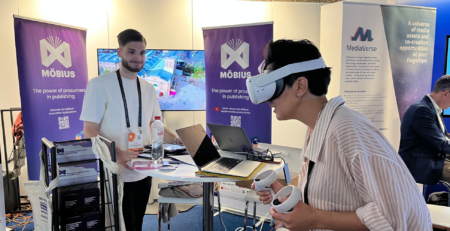Business exploitation scenarios for prosumer book publishing
This article presents IMEC-SMIT’s business modellers. Due to the importance of the prosumer in the Möbius project, its complicated relationship with IP-developing desirable business models becomes a challenge. We propose three dimensions as central to understanding this dynamic. First, the originality of the work; second, the degree to which the prosumer retains exploitation rights; and third, whether the prosumer can enjoy revenue sharing with the platform on which the work is published. When combined, these dimensions create several possible business exploitation scenarios. In the following paragraphs, we discuss the three dimensions and how they interact with original and non-original content.
Originality
The first dimension concerns whether a prosumer published original content on the platform, meaning that the content doesn’t include any elements protected by copyrights – or whether a prosumer published content based on existing content (fan-fiction), protected by copyright.
Both works, created by prosumers, are present on the spectrum, from original works to fan-fiction content. On the one side, we find “original works”, unique content written by the prosumer that doesn’t use any protected IP. Meaning that the prosumers here are not authors of so-called ‘fan-fiction’ but authors of original works to which the general regulations apply. On the other side of the spectrum, we find the prosumer, who writes “fan-fiction” based on existing franchises and, therefore, explicitly using protected IP.
This point in the analysis leaves aside variations in different kinds of protected IP that the fan-fiction writer may be using, although other legislation will apply depending on which type of IP the fan-fiction author uses. This should be cleared out through further analysis.
Exploitation rights
The second dimension concerns whether the author of the work that is published on the platform is allowed to retain certain exploitation rights in other exploitation forms (e.g., merchandise). In the prosumer scenario, the exploitation rights determine if the prosumer has access to additional commercial exploitation rights or not.
Authors are expected to enjoy the freedom to license their original content to whomever they want to leverage their IP. From book to Netflix series, additional merchandise, spin-off content, etc. The list for exploitation seems endless for those who hold the rights of the IP, which isn’t the case for the prosumer fan fiction writer.
Revenue sharing
The third dimension relevant for business model scenarios concerns whether a prosumer receives a share of the revenues of the platform on which the prosumer’s work is published or not. These can be indirect revenues such as advertising on the publication platform or direct payments from direct donations from visitors via the forum, therefore, not considering any additional exploitation revenue.
At this point of the analysis, we make an abstraction of the distinction between direct revenues from retail sales paid by the end-consumer when purchasing the product and indirect revenues such as advertising paid by a third-party advertiser/sponsor/subsidizer.
Looking back at the prosumer who creates original content, we perceive any form of financial incentive as usual. Yet, looking at the prosumer writing fanfic, this seems to be a slippery slope towards copyright infringement. More research is required to develop a sustainable business model, where both IP holders and fanfic-prosumer can coexist, with or without an economic incentive.
Conclusion
Project Möbius is built around the involvement of the prosumer and its creativity. Yet, matching creative enthusiasm (channelled into fanfic) with existing laws and regulations. Within the project Möbius, we strive to let the prosumer be part of the publishing industry and freely distribute their content. But we cannot ignore the regulation frameworks protecting the IP of authors. Prosumers who write original content experience fewer issues than prosumers expanding on existing IP.
We wrote this blog post to stress the grey areas in which some prosumers find themselves and raise awareness of these insights among publishers. If we want to integrate the prosumer fully, we will need to think critically about how IP interacts with non-original content.
Olivier Braet and Thomas Van Dam (imec-SMIT)












